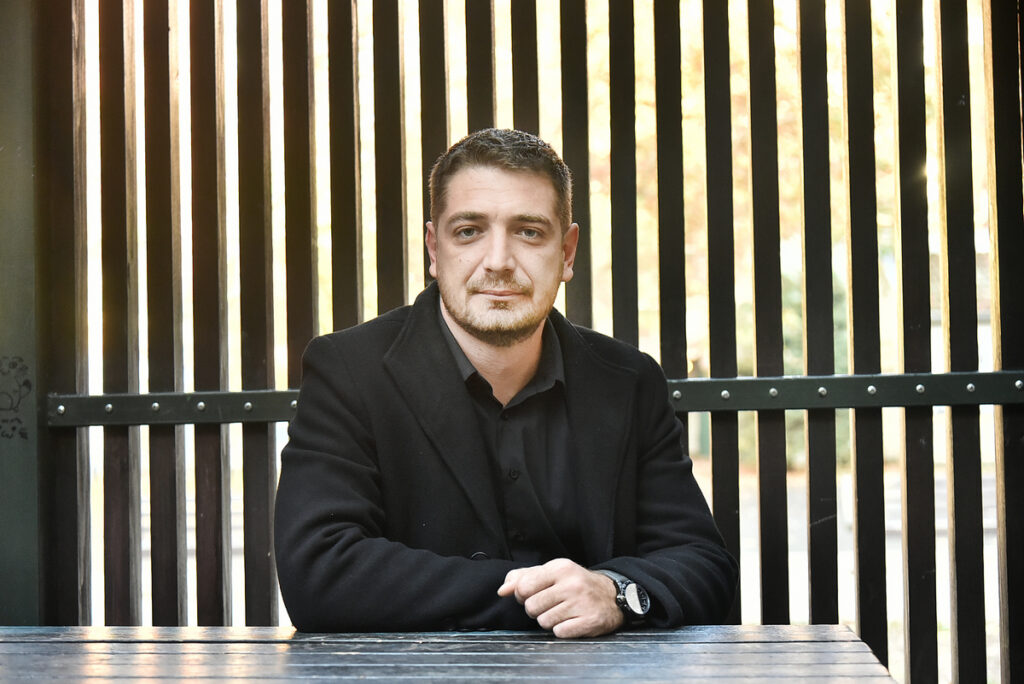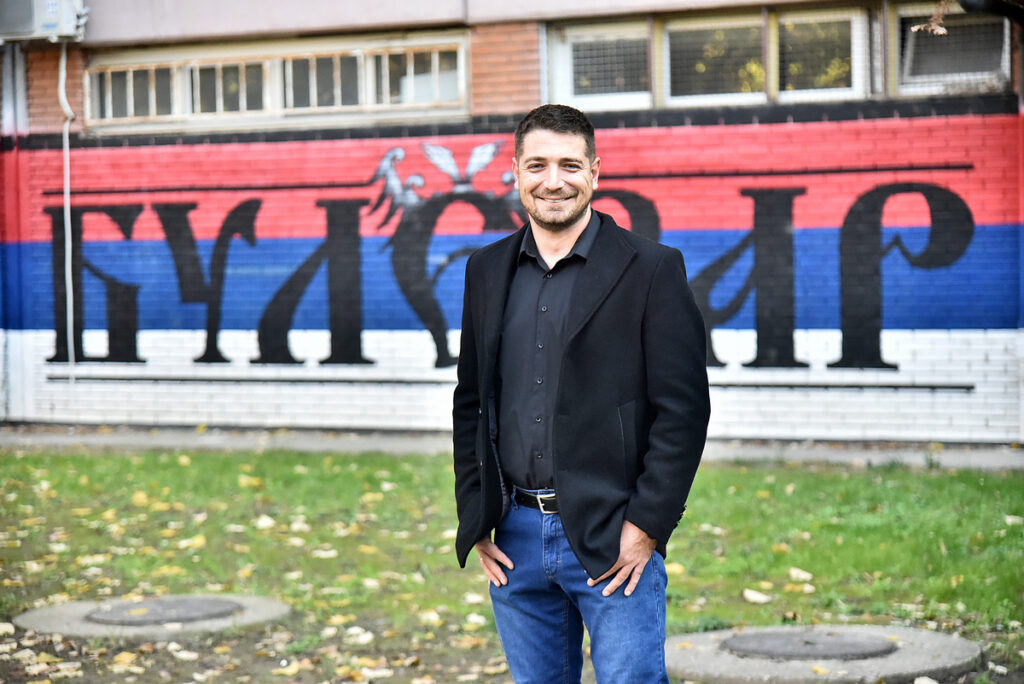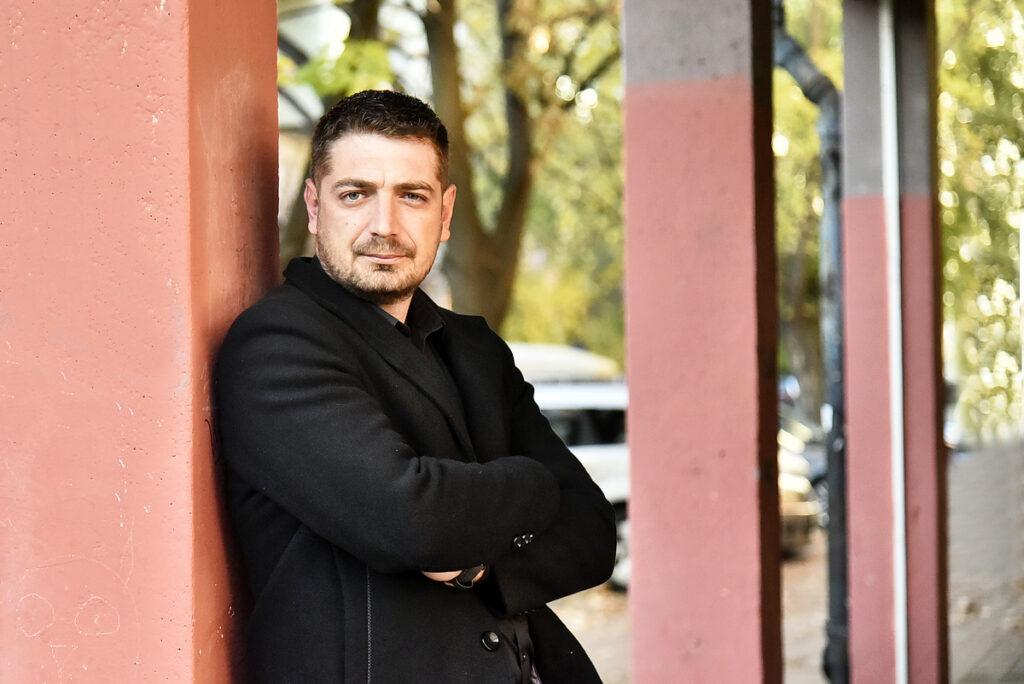Inside the reality of journalism caught between the system and the streets

MEDIA INTERVIEW
by Dragan Nikolić
Uglješa Bokić
Journalist, Danas
Uglješa Bokić, a journalist and former police officer, belongs to a rare group of reporters who understand both sides of the system they write about. After more than a decade inside the Ministry of the Interior, he entered journalism with a perspective shaped by investigations, field work and direct exposure to the mechanisms of power.
Information today is the most potent weapon — and that is no longer a cliché
Although it often seems that the police and journalism professions stand on opposite sides, almost as natural adversaries, is there room for a joint struggle for professional rights and integrity?
I would say that I do not currently see that willingness in the police. In journalism, it exists to some extent, but not in the police. Police officers generally view journalists in a very negative light, and I find that somewhat understandable. I often say: police officers are far more afraid of journalists than journalists are of police officers. On the other hand, there is also animosity from journalists toward the police. When I moved into journalism, my current colleagues initially viewed me as a police officer who might have “come to snoop around and relay information to certain centres.” I had to earn their trust patiently and consistently by doing my job correctly.
These two professions often see each other as opponents because they “get in each other’s way.” My work, for example, depends to a great extent on my relationship with the police. I am not exaggerating when I say that around 80% of my story sources come from the Ministry of the Interior. Of course, those sources do not give me information “out of goodwill.” There are situations when a police officer gets into trouble and realises he has been left on his own. In such cases, he will very often turn to the media – anonymously or openly – because he is trying to save himself, like any citizen.
So, although we are considered “natural enemies,” the truth is that these two professions depend on each other. And that connection is there and will remain so long as both the police and journalism exist.

Pressures on journalists come not only from the police but also from the highest levels of the system. You have faced attacks, threats and various forms of pressure yourself. What advice would you give to journalists who lack that kind of experience?
These pressures come least from the police. We do have incidents, that is true, especially now while the protests are ongoing. But those attacks by police officers on journalists are mostly individual and momentary. They are situations in which an officer reacts out of adrenaline, nervousness or personal impulse. It is rarely an order “from above.”
Much more serious pressures come from the security structures. Not only the Ministry of the Interior, but above all, the Security Intelligence Agency, which is far more active in such matters.
I have never personally received a serious threat, despite working on highly sensitive topics. That is why I sometimes fear silence more than a public threat. When discussing advice for colleagues, especially younger ones, there are several concrete things to consider. Investigative portals and newsrooms run high-quality training. They have established security protocols that they follow, and these have proven effective.
Anyone who decides to work in this type of journalism must develop a habit of caution. For example, I rarely speak to anyone over an open line. I pay attention to where I sit, who is around me, and who is listening to me. And what I always repeat: safety comes first. There is no news item, footage, photograph or story that is worth more than human life and health. So, it is important to be honest with yourself: “This I can do” or “This I cannot do.” That is not weakness; it is professional responsibility. Ultimately, prevention is the mother of safety.
To remain independent, you must first do your job well. If no one needs you, no one will try to pressure you
It may sound utopian, but how can a journalist remain independent in such an environment, especially when dealing with topics that touch on crime, corruption and the work of security services?
I don’t think that is a utopian question. It is a matter of personal attitude — of how a person approaches their job. When I chose to go into journalism, I told myself one key thing: I left the service because I could not work in the way I believed was right. I have no intention of ending up in the same situation again. To remain independent, you must first of all do your job well. You have to be competent and professional, because if no one needs you, no one will even try to put pressure on you. When you work seriously, those who try to influence you quickly realise it will not be easy.
Second, I was not born a journalist, just as I was not born a police officer. I learned both, just as one comes to know everything in life. And only after I left the Ministry of the Interior did it become completely clear to me: I will do this job, first, as long as I want to do it, and second — which is even more critical — as long as I can do it in the way I believe is right. The moment I can no longer do it that way, I will not do it. But I will not leave quietly. If someone tries to censor me, pressure me, or hold me back, I will speak out publicly and make a noise about it. And I have absolutely no problem doing something completely different tomorrow — driving a taxi, doing manual work, changing professions. I have never believed that a person must do only one thing in life. It is a matter of choice.
What matters is that whatever you do, you do it properly. If you respect that, you will succeed in anything, regardless of what it is. Of course, I love my job and enjoy it, but if I cannot do it honourably and professionally, then I will not do it. I will fight as long as it makes sense, but I will not persist at the cost of losing myself.
You entered the journalism profession relatively recently. Did you expect all these challenges, or were there still some surprises for you?
Yes, I only entered it relatively recently. It has been about two years since I began working in journalism actively and, let’s say, professionally. Honestly, I did not expect to be doing this job at this level. Initially, I wasn’t even sure whether I would be able to work as a journalist at all. I owe gratitude to the people who gave me a chance, because to even start doing this job, someone has to provide you with initial trust, space and support. And I am sincerely grateful to them for that.
I did not, however, expect the intensity. I didn’t expect to be practically in this job 24 hours a day. Not physically, but mentally, I am constantly “switched on”. And I can’t remember the last time I had a day when I completely switched off. I don’t think a good journalist can afford that — to go away and disappear for a couple of days.
Imagine not being able to follow what is happening for 4–5 days in an environment like this. It would take you another two weeks to catch up with everything you missed. The pace is insane, and things change constantly. So yes, this job wears a person down — mentally and physically. For now, I manage to endure that rhythm. If at some point I feel I can’t anymore, I will probably slow down a bit, “let go of the gas”. For now, I can handle it, but we’ll see what comes next.

We often witness confidential information leaking from the police, with serving politicians using it as a tool for mutual attacks. However, when information leaks to independent media as a result of whistleblowing, SLAPP lawsuits and pressure to reveal sources often follow immediately. How can one today, both as a journalist and as a citizen, protect oneself from the flood of information used as a weapon, even when they are “blanks”?
Information today is the most potent weapon. And that is no longer a cliché. We live in a time in which leaks from the system are not an exception but the rule. I have no problem with information leaking from the Ministry of the Interior — for me, as a journalist who covers security topics, it often helps. However, there is a significant distinction between information that is in the public interest, exposing unlawful conduct, abuse, or corruption, and information that is deliberately released solely to discredit a political opponent or to generate more clicks and sell more headlines. And we must draw that distinction very clearly.
As for SLAPP lawsuits — that is indeed a major problem, especially for small newsrooms. Large outlets can somehow withstand that pressure, but small ones, which barely survive as it is, can practically be shut down by a SLAPP. Because even if you eventually win the case, the process is long, expensive and exhausting. And by the time you prove you were right, the newsroom may already no longer exist.
This is not only our problem. Europe and the rest of the world are struggling with it as well, but here it is used far more aggressively than elsewhere. And it is most often not a direct attack on an individual journalist, but on editors and on the newsroom itself. It is pressure on the infrastructure, not just on the individual.
Still, there is one positive thing: solidarity. We recently saw an example of this with a local media outlet in Inđija. Colleagues, associations, citizens — everyone mobilised, donated, helped that outlet survive. And that matters. Local media are the foundation of objective journalism. They are disappearing, slowly but surely, and if we lose them, we will lose contact with reality, with real life in this country.
Therefore, the answer is a combination of three pillars: a professional assessment of which information is truly in the public interest and which is manipulation; legal and organisational protection of newsrooms; and mutual solidarity within the profession. Without that, this job truly cannot be done today.
I will fight as long as it makes sense, but I will not persist at the cost of losing myself
In earlier interviews, you said that you want to focus on investigative journalism. Shouldn’t all journalism be investigative? What, for you, is the essence of that work, and which topics do you see as the most important for deeper investigation in Serbia today?
Journalism by its nature indeed has an investigative character. However, not every journalistic task has the same level of intensity. Not every topic can be approached with the same depth and duration, because that often requires time, resources and, at times, an entire team working on a single story. In daily newsrooms, such as Danas, we cover fast, current topics, but I am grateful to the editors for allowing me to work in parallel on long-term stories.
That is why I said that my goal is to work in investigative journalism. I am already doing that, perhaps not at the same level as colleagues from KRIK, but it should be kept in mind that their newsroom deals exclusively with such stories. At Danas, I primarily work on topics related to security, the police, and services, and colleagues step in when needed. However, the work structure is quite different.
To me, it came naturally in a way. At the Ministry of the Interior, I also worked on investigations. The process is very similar: to “solve” a case, you must investigate, verify, collect evidence, and assemble a logical whole. I still use those methods today. I always imagine a situation in which what I write needs to withstand a court of law. If I can “stand behind it” as if before a judge, only then do I know I have a story.
But that requires time, effort and patience. I have had cases where I abandoned major stories, even though I knew they were true. I was unable to gather sufficient evidence to present it to the public professionally and clearly. That does not mean I closed them. I keep them on standby. Sometimes they may open up, sometimes not — but I never discard anything.
People contact me every day. Nine out of ten stories turn out to be empty, inaccurate or irrelevant. But I never dismiss anyone immediately. I always listen. Because sometimes it is precisely that “ordinary” person, entirely outside the system, who comes across the key piece of information. And that is why I never throw anything away in advance — it just takes time to sift through it all.
All Photos: Mladen Sekulić